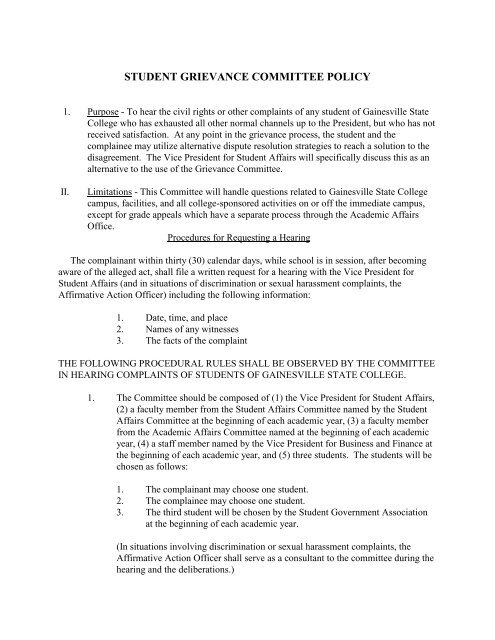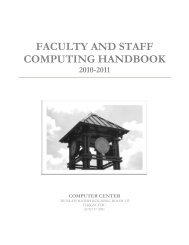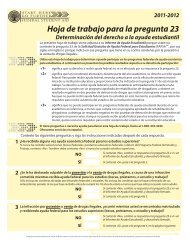STUDENT GRIEVANCE COMMITTEE POLICY - Gainesville State ...
STUDENT GRIEVANCE COMMITTEE POLICY - Gainesville State ...
STUDENT GRIEVANCE COMMITTEE POLICY - Gainesville State ...
Create successful ePaper yourself
Turn your PDF publications into a flip-book with our unique Google optimized e-Paper software.
<strong>STUDENT</strong> <strong>GRIEVANCE</strong> <strong>COMMITTEE</strong> <strong>POLICY</strong><br />
1. Purpose - To hear the civil rights or other complaints of any student of <strong>Gainesville</strong> <strong>State</strong><br />
College who has exhausted all other normal channels up to the President, but who has not<br />
received satisfaction. At any point in the grievance process, the student and the<br />
complainee may utilize alternative dispute resolution strategies to reach a solution to the<br />
disagreement. The Vice President for Student Affairs will specifically discuss this as an<br />
alternative to the use of the Grievance Committee.<br />
II. Limitations - This Committee will handle questions related to <strong>Gainesville</strong> <strong>State</strong> College<br />
campus, facilities, and all college-sponsored activities on or off the immediate campus,<br />
except for grade appeals which have a separate process through the Academic Affairs<br />
Office.<br />
Procedures for Requesting a Hearing<br />
The complainant within thirty (30) calendar days, while school is in session, after becoming<br />
aware of the alleged act, shall file a written request for a hearing with the Vice President for<br />
Student Affairs (and in situations of discrimination or sexual harassment complaints, the<br />
Affirmative Action Officer) including the following information:<br />
1. Date, time, and place<br />
2. Names of any witnesses<br />
3. The facts of the complaint<br />
THE FOLLOWING PROCEDURAL RULES SHALL BE OBSERVED BY THE <strong>COMMITTEE</strong><br />
IN HEARING COMPLAINTS OF <strong>STUDENT</strong>S OF GAINESVILLE STATE COLLEGE.<br />
1. The Committee should be composed of (1) the Vice President for Student Affairs,<br />
(2) a faculty member from the Student Affairs Committee named by the Student<br />
Affairs Committee at the beginning of each academic year, (3) a faculty member<br />
from the Academic Affairs Committee named at the beginning of each academic<br />
year, (4) a staff member named by the Vice President for Business and Finance at<br />
the beginning of each academic year, and (5) three students. The students will be<br />
chosen as follows:<br />
1. The complainant may choose one student.<br />
2. The complainee may choose one student.<br />
3. The third student will be chosen by the Student Government Association<br />
at the beginning of each academic year.<br />
(In situations involving discrimination or sexual harassment complaints, the<br />
Affirmative Action Officer shall serve as a consultant to the committee during the<br />
hearing and the deliberations.)
2. The parties concerned shall be given written notice of the time and place of the<br />
hearing at least ten (10) calendar days while school is in session, in advance<br />
thereof. Such notice may be delivered by hand or by certified or registered mail,<br />
return receipt requested, to the complainant's last known address.<br />
3. The Committee hearing will be conducted in private and follow parliamentary<br />
procedure.<br />
4. During the proceeding, the parties concerned will be permitted to have a<br />
nonparticipating advisor of his or her choice.<br />
5. A tape recording, transcript or written summary of the proceedings shall be kept<br />
and made available to the parties concerned in the event an appeal is filed.<br />
6. The parties concerned shall be afforded an opportunity to obtain and present<br />
witnesses and documentary or other evidence.<br />
7. The Hearing Committee shall have the right to investigate all facets of the<br />
student's grievance. The Committee will not be bound by strict rules of legal<br />
evidence. The Committee may receive any evidence of probative value in<br />
determining the issues involved. Every possible effort will be made to obtain the<br />
most reliable evidence available. All questions relating to admissibility of<br />
evidence or other legal matters will be decided by the Chairperson or presiding<br />
office.<br />
8. An oath or affirmation shall be administered to all witnesses by a notary public.<br />
9. Where the witness cannot appear because of illness or other cause acceptable to<br />
the Committee, the sworn statement (Affidavit) of the witness may be introduced<br />
into the record. In such event the opposite party shall have the right to file<br />
counter-affidavits within three (3) days following the completion of the hearing.<br />
10. The recommendation of the Committee will be based on the evidence introduced<br />
at the hearing and should be made within ten (10) calendar days, while school is<br />
in session, after the date of the hearing or within ten (10) calendar days while<br />
school is in session, after receipt of the transcript of the hearing if one is deemed<br />
necessary before a decision is rendered. The Committee will report its<br />
recommendations, based upon a preponderance of the evidence, to the President.<br />
If the President does not concur with the report, he/she should state his/her<br />
reasons in writing to the Committee for response before rendering his/her final<br />
decision.<br />
11. Public statements and publicity about the complaint should be avoided.
12. In making his/her decision, the President will not be bound by recommendations<br />
of the Committee. The President shall, within ten (10) calendar days while school<br />
is in session, after receipt of written notification of the recommendations of the<br />
Committee, advise the complainant and other parties concerned in writing of<br />
his/her decision.<br />
13. After complying with the foregoing procedures, the President shall send an<br />
official letter to the student notifying him/her of his/her decision. Such letter shall<br />
be delivered to the addressee only, with receipt to show to whom delivered, when<br />
delivered, and address where delivered.<br />
14. The complainant shall also be advised in writing of his/her right to apply to the<br />
Board of Regents for review of the President's final decision in accordance with<br />
the provision of Article VIII of the Bylaws of the Board of Regents.<br />
15. The complainant shall not be harassed or penalized for proper utilization of the<br />
complaint procedures.<br />
(Editorially Revised, July, 2011)




